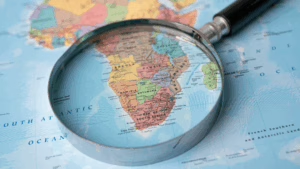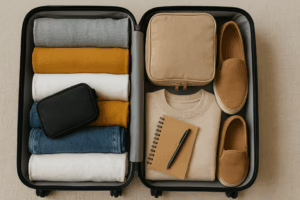The Domestic Deal Hunt Begins
While it is possible to find good deals, traveling in the United States is not always a budget-friendly proposition. Expenses pile up quickly, even for a short weekend trip to a nearby city. Sky-rocketing inflation makes prices even more expensive, affecting the cost of airfare, car rentals, and hotels. Even with all these factors, if you are strategic, flexible, and use the right tools, it is possible to score great deals without sacrificing comfort or spontaneity.
Whether you are planning a remote mountain getaway, surf and sand at the beach, or a long weekend in the city complete with dining, plays, and professional sports, this guide will help you uncover the best ways to save on domestic travel. From tracking airfare to timing hotel bookings, this is how savvy travelers cut costs on travel.
Flexible Tools to Track Tip Prices
Airfare and lodging prices fluctuate like crypto since it is 24/7. The best method is to track tickets over time and seize a deal when rates drop. Google Flights is a reliable resource for ticket tracking. You can set up notifications for your preferred destinations, and you will get emails when prices change.
The Hopper app predicts the best times to buy flights and hotels using historical data and AI. It will tell you to wait or when to book, and it can even freeze a price for you if you are not ready to put down your credit card. According to Hopper, domestic airfare prices can fluctuate by up to 40% within a single month.
Avoid flying on Fridays and Sundays, if possible. Midweek travel, especially on Tuesdays and Wednesdays, tends to be cheaper overall. Three to six weeks in advance, which is the window for the best rates.
Regional Airports – A Hidden Gem
Smaller regional airport hubs can yield surprising savings, especially if you are flying on a low-cost carrier. For example, flying into Burbank instead of LAX or Fort Lauderdale instead of Miami can shave hundreds off your round-trip ticket. As someone living in South Florida, I can save money flying from Fort Lauderdale as opposed to Palm Beach International, even though Palm Beach International is a much smaller airport.
Some budget airlines like Avelo, Breeze Airways, and Allegiant specialize in direct flights between smaller U.S. cities. These flights often skip large hubs and connect underserved routes with lower demand, resulting in lower prices. Just make sure to factor in the cost of transportation from the airport to your destination, including parking
Compare Hotels, Vacation Rentals, and Everything in Between
Hotels, motels, and inns are not the only options for a place to stay when traveling in this era. Depending on your travel style, vacation rentals, hostels, and even university dorms (during summer) can offer less expensive pricing and, in some cases, put you closer to activities. Platforms like Kayak and Trivago aggregate listings across sites so you can easily compare rates.
Airbnb and Vrbo can be cost-effective for groups or longer stays, but fees can quickly add up. Always compare the final price (including cleaning and service fees) with a hotel rate before booking.
If you do decide to book a hotel, check prices directly on the hotel’s website after seeing them on aggregators. Some chains offer a discount or perk (like free breakfast, Wi-Fi, AAA, or military discounts) when you book directly.
The Domestic Deal Hunt Begins
While it is possible to find good deals, traveling in the United States is not always budget-friendly. Expenses can rack up quickly, even for a short weekend trip to a nearby city. Increasing inflation makes prices even more expensive, with inflation affecting the cost of airfare, car rentals, and hotels. However, if you are strategic, flexible, and use the right tools, it is possible to score great deals without sacrificing comfort or spontaneity.
Whether you are planning a remote mountain getaway, surf and sand at the beach, or a long weekend in the city complete with dining, plays, and professional sports, this guide will help you uncover the best ways to save. From tracking airfare to timing hotel bookings, this is how we have found that savvy travelers cut costs and make the most of their money.
Sign Up for Alerts, Rewards, and Member-Only Discounts
Loyalty programs can also lower the price of travel. Hotel and airline rewards programs are free to join. Even if you only fly occasionally, signing up can get you early access to sales or bonus points for future travel.
Websites like Scott’s Cheap Flights (now Going) and Dollar Flight Club alert you to limited-time deals and mistake fares. While these services tend to focus on international travel, they also flag deep domestic discounts, often under $100 round-trip. When was the last time you flew for under $100?
Furthermore, many hotel chains and booking platforms offer members-only pricing or perks. Hilton Honors, Marriott Bonvoy, and Expedia Rewards members can unlock discounts you will not find on public listings.
Timing Is Everything
Timing is everything; when you travel matters in terms of time of day and month can affect your rate, in addition to the airports you choose for departure and arrival.. Avoid peak travel periods like major holidays, school breaks, and long weekends. Prices can increase as much as double during those timeframes..
We recommend traveling in early spring and fall, when crowds are less and prices drop. September, for example, is a great time for travel to many destinations. The reason is that it is after the summer rush, but before the massive holiday demand.
For hotels, we recommend booking at least two to three weeks in advance for the best balance between availability and pricing. Last-minute deals do exist, especially in major cities, but they are harder to count on if your dates are fixed.
Explore Underrated Destinations for Big Savings
When planning domestic travel, many people gravitate toward the well-known hotspots, such as New York City, Orlando, or Las Vegas. But exploring underrated destinations can offer major savings and unique experiences. Secondary cities like Chattanooga, Tucson, and Milwaukee are often cheaper across the board, from flights and hotels to dining and activities, but still offer great environments and entertainment.
These locations may not be on your radar, but they often have beautiful walkable downtowns, quaint local attractions, and are less crowded. Many secondary cities also have strong tourism boards that partner with local businesses to offer discounts or seasonal passes for visitors. For example, cities like Kansas City or Boise regularly promote bundled attractions or food tours that rival big-city offerings for half the price.
Additionally, events and festivals in smaller cities often coincide with lower hotel rates since demand is not as high as in Los Angeles, Dallas, or Miami. We recommend you check the local calendar before you book in order to secure unique experiences without inflated prices. By pursuing the road less traveled, you can stretch your travel budget further and potentially discover a new favorite getaway spot you would have otherwise not considered.
Travel by Train or Bus for Budget-Friendly Flexibility
Consider traveling by train or bus, especially for regional trips. Amtrak offers competitive fares between major and mid-size U.S. cities, and with perks like roomy seating, scenic routes, and free Wi-Fi, the experience often beats flying in terms of comfort and convenience. In South Florida, for example, we have a train called the Brightline, which will take you from Miami to Orlando in just a few hours.
Megabus, FlixBus, and Greyhound also operate affordable, no-frills intercity service with prices as low as $10 if you book early. These options are ideal for shorter routes, like Boston to New York or Chicago to Indianapolis. You will save on airfare and avoid the hidden costs of airport parking, checked baggage, and rideshares.
Trains and buses are also more flexible when it comes to last-minute plans. If your schedule allows, you can often score same-day tickets without the steep surge pricing airlines charge. And for environmentally conscious travelers, these modes of transport are typically more sustainable.
While not always the fastest option, overland travel opens up scenic routes and hidden gems you might miss from 30,000 feet. With a little planning and a flexible attitude, it can be a rewarding and cost-saving way to explore the U.S.
Stack Savings with Local Coupons and City Passes
Even after you have secured your flight and lodging, there are more ways to save once you’ve arrived. Many cities offer free or low-cost discount cards, like Go City or CityPASS, that bundle entry to top attractions, museums, and tours for one flat fee. These passes can shave 40% or more off regular ticket prices.
Local tourism websites are another goldmine for printable or mobile coupons. Restaurants, attractions, and even local transit companies often post time-limited deals or visitor-exclusive offers. Some hotel lobbies even stock coupon booklets for nearby attractions.
Follow the city’s tourism board or local influencers on social media. They often share flash deals, seasonal events, and pop-up discounts not listed anywhere else. If you’re traveling in a group or with kids, these little extras add up fast.
By stacking city passes with other discounts and staying alert to local promotions as well, you will strategically stretch every dollar. Travel at discounted rates simply means knowing where to look.
Bundle, Save, And Read the Fine Print
Bundling your flight, hotel, and rental car can unlock savings, especially on sites like Expedia, Priceline, or Costco Travel. These packages often come with a lower total price than booking each component separately. Some of these sites display the actual savings you receive in the bundle versus the separate purchases.
Even with this information displayed, it is still important to compare the price of each component individually to make sure it is really a deal. Also, check cancellation policies carefully. If you need to change your plans, packages can be trickier to modify. I have experienced this hand in a few situations where it has cost me $100 for the change.
Some credit cards also offer travel portals that allow you to redeem points for bundled deals. Chase, Amex, and Capital One all have competitive platforms that occasionally include flash sales exclusive to cardholders which can also help you save.
Use Credit Cards Strategically
Speaking of cards, using a specific credit card for travel can make a big difference. Many cards offer sign-up bonuses, travel insurance, free checked bags, or statement credits for hotels and airline purchases.
For domestic travel, a cash-back card might be just as valuable as a points card, especially if you are driving or having a staycation. Research cards with no foreign transaction fees (just in case you cross into Canada or Puerto Rico) and good reward categories for travel, dining, and gas.
Before booking anything, check and see if your card offers price protection or trip delay coverage. If the unfortunate situation arises, this can save you headaches and money
Beware of Hidden Fees and Pitfalls
A cheap ticket or hotel does not always mean a good deal. Airlines may tack on baggage fees, seat selection charges, or even fees for seats and carry-ons.. Budget carriers like Spirit or Frontier have especially strict policies, so read the fine print.
Hotels and resorts may charge mandatory fees for amenities, parking, or resort access, especially daily resort fees. These often are not included in the initial price you see, so make sure you confirm the total before you book.
Bottom line: the lowest price that is displayed as your total is not always the best value. Always factor in what is included and what’s not.
Smaller regional airport hubs can yield surprising savings, especially if you are flying on a low-cost carrier. For example, flying into Burbank instead of LAX or Fort Lauderdale instead of Miami can shave hundreds off your round-trip ticket. As someone living in South Florida, I can save money flying from Fort Lauderdale as opposed to Palm Beach International, even though Palm Beach International is a much smaller airport.
Some budget airlines like Avelo, Breeze Airways, and Allegiant specialize in direct flights between smaller U.S. cities. These flights often skip over the large hubs and connect underserved routes with lower demand, which results in lower prices.
Make sure to factor in the cost of transportation from the airport to your destination, including parking. However, when the fare difference is steep, it might be worth the detour.
TL;DR: Quick Tips for Finding Domestic Travel Deals
- Use Google Flights and Hopper to track and predict flight prices.
- Fly midweek and avoid peak travel dates.
- Compare regional airports and budget airlines.
- Sign up for rewards programs and deal alerts.
- Check both hotel rates, Airbnb, VRBO, and vacation rentals.
- Bundle trips when it makes sense, but verify each component.
- Use credit cards with travel perks and insurance.
- Always check the final cost, including taxes and fees.
- Explore underrated destinations and travel during off-peak times.
- Consider buses and trains for affordable, flexible travel.
- Use city passes and local coupons to save once you arrive.
With the right timing and tools, travel within the U.S. does not have to cost a fortune. Stay flexible, do your research, and book strategically, and you will be able to save money, uncover new destinations, and see an ROI on your trip satisfaction.
















